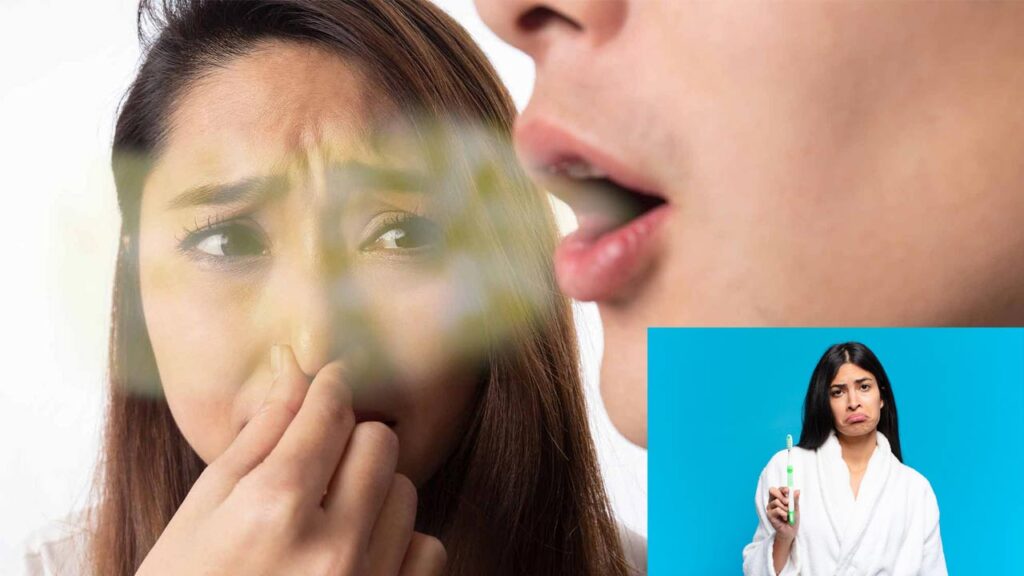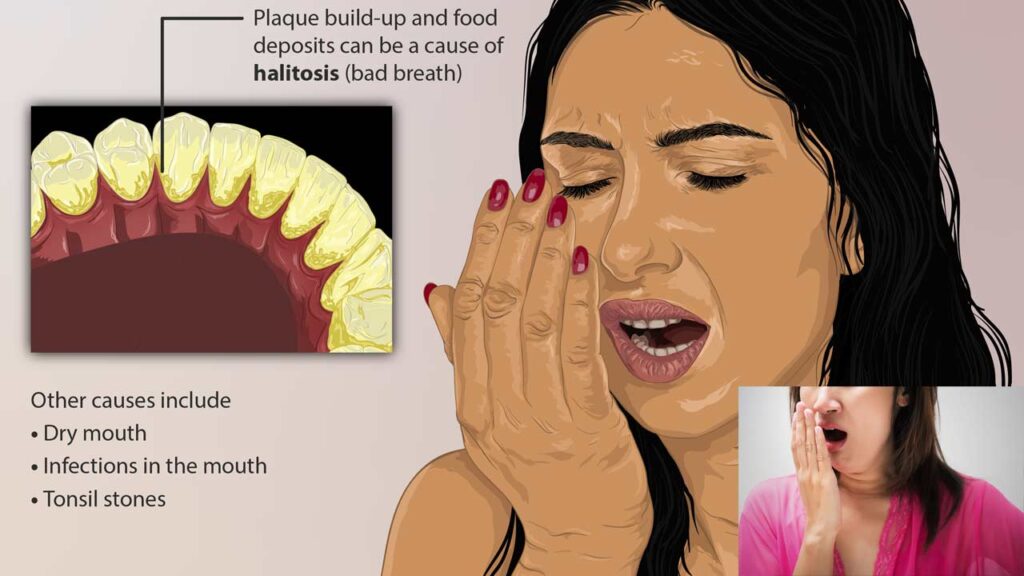Bad breath, also known as halitosis, is a common condition that affects millions of people worldwide. It can have a negative impact on one’s self-esteem, social life, and professional success. But what causes bad breath and how can it be prevented? In this article, we will explore the role of dental hygiene in preventing bad breath and improving oral health.
What Causes Bad Breath?
The main cause of bad breath is the accumulation of bacteria in the mouth, especially on the tongue, teeth, and gums. These bacteria produce volatile sulfur compounds (VSCs), which are the primary culprits behind bad breath. VSCs have a foul smell that can be detected by others and by oneself.
There are many factors that can contribute to bad breath, such as:

Poor oral hygiene:
If you do not brush your teeth twice a day, floss daily, and use an antibacterial mouthwash, you are allowing plaque and tartar to build up on your teeth and gums. Plaque and tartar are sticky substances that harbor bacteria and VSCs. They can also cause tooth decay, gum disease, and other oral problems.
Dry mouth:
If you do not produce enough saliva, your mouth becomes dry and creates an ideal environment for bacteria to grow. Saliva helps wash away food particles, neutralize acids, and prevent infections. Dry mouth can be caused by dehydration, smoking, certain medications, or medical conditions.
Smoking:
Smoking not only dries out your mouth, but also damages your gums and stains your teeth. It also affects your sense of smell and taste, making you less aware of your bad breath. Smoking can also increase your risk of oral cancer and other diseases.
Certain foods and drinks:
Some foods and drinks can leave a strong odor in your mouth or affect the balance of bacteria in your mouth. For example, garlic, onion, coffee, alcohol, and dairy products can cause bad breath. Some foods can also get stuck between your teeth or on your tongue, providing food for bacteria.
Medications:
Some medications can cause dry mouth or alter the composition of your saliva. For example, antihistamines, antidepressants, diuretics, and blood pressure drugs can affect your saliva production or quality. Some medications can also release chemicals that can be carried in your breath.
Medical conditions:
Some medical conditions can cause bad breath or affect your oral health. For example, diabetes, kidney disease, liver disease, sinus infections, tonsillitis, acid reflux, and cancer can cause bad breath. Some of these conditions can also affect your saliva production or quality.
What is Dental Hygiene?
Dental hygiene is the practice of keeping your mouth clean and healthy by removing plaque and tartar from your teeth and gums, reducing the amount of bacteria and VSCs in your mouth, and maintaining a healthy oral environment.
Dental hygiene involves:
Brushing twice a day with fluoride toothpaste:
Brushing helps remove plaque and food particles from your teeth and gums. It also helps prevent tooth decay and gum disease. You should brush for at least two minutes using a soft-bristled toothbrush and fluoride toothpaste. Fluoride helps strengthen your enamel and protect your teeth from cavities.
Flossing daily:
Flossing helps remove plaque and food particles from between your teeth and under your gum line. It also helps prevent gum disease and bad breath. You should floss at least once a day using dental floss or an interdental cleaner.
Using an antibacterial mouthwash:
Mouthwash helps kill bacteria and VSCs in your mouth. It also helps freshen your breath and prevent infections. You should use an antibacterial mouthwash at least once a day after brushing and flossing. You should swish it around your mouth for at least 30 seconds before spitting it out.
Scraping or brushing the tongue:
The tongue is a major source of bacteria and VSCs in the mouth. It can also trap food particles and debris on its surface. Scraping or brushing the tongue helps remove these substances and improve your breath. You should scrape or brush your tongue at least once a day using a tongue scraper or a toothbrush.
Visiting a dental hygienist regularly for professional cleaning and check-up:
A dental hygienist is a licensed oral health professional who specializes in preventing and treating oral diseases. They perform oral assessments, take X-rays, clean teeth and gums, apply fluoride and sealants, educate patients on proper oral care, and provide personalized advice and recommendations.
A dental hygienist can help you prevent bad breath by:
Removing plaque and tartar from your teeth and gums:
Plaque and tartar are hard to remove by yourself and can cause bad breath, tooth decay, and gum disease. A dental hygienist can use special instruments and techniques to remove them from your teeth and gums. This can also improve the appearance of your smile.
Applying fluoride and sealants to your teeth:
Fluoride and sealants are protective substances that can help prevent cavities and tooth decay. Fluoride helps strengthen your enamel and protect your teeth from acid attacks. Sealants are thin coatings that are applied to the chewing surfaces of your back teeth to prevent food and bacteria from getting into the grooves and pits. A dental hygienist can apply fluoride and sealants to your teeth during your visit.
Educating you on proper oral care:
A dental hygienist can teach you how to brush, floss, use mouthwash, and scrape or brush your tongue effectively. They can also show you how to use other oral hygiene products, such as electric toothbrushes, water flossers, or dental picks. They can also answer any questions you may have about your oral health or bad breath.
Providing personalized advice and recommendations:
A dental hygienist can assess your oral health and identify the source of your bad breath. They can also suggest appropriate solutions for your specific situation. For example, they can recommend products that neutralize VSCs, such as zinc or chlorine dioxide mouthwashes, or refer you to other specialists if they suspect an underlying medical condition.
How Can Dental Hygiene Prevent Bad Breath?
By following good dental hygiene practices and visiting a dental hygienist regularly, you can improve your oral health and prevent bad breath. This can also benefit your overall health and well-being, as poor oral health has been linked to various diseases and complications, such as heart disease, diabetes, pneumonia, and pregnancy problems.
Some of the benefits of dental hygiene for preventing bad breath are:
- It removes plaque and tartar from your teeth and gums, which harbor bacteria and VSCs that cause bad breath.
- It reduces the amount of bacteria and VSCs in your mouth, which produce foul-smelling gases that can be detected by others and by yourself.
- It maintains a healthy oral environment, which prevents infections, inflammations, and diseases that can affect your breath.
- It freshens your breath by killing bacteria and VSCs, neutralizing odors, and stimulating saliva production.
- It improves your appearance by making your teeth cleaner, whiter, and brighter, which can boost your confidence and self-esteem.
- It enhances your sense of smell and taste by removing substances that interfere with them, such as tobacco, food particles, or medications.
- It prevents other oral problems that can affect your breath, such as tooth decay, gum disease, cavities, abscesses, or oral cancer.
FAQ
Q: What are some signs of bad breath?
A: Some signs of bad breath are:
- A foul or unpleasant smell in your mouth or on your breath
- A dry or sticky feeling in your mouth
- A white or yellow coating on your tongue
- A metallic or sour taste in your mouth
- Difficulty speaking or swallowing
- Complaints from others about your breath
Q: How can I test if I have bad breath?
A: There are a few ways to test if you have bad breath, such as:
- Licking the back of your hand and smelling it after a few seconds
- Scraping the back of your tongue with a spoon or a tongue scraper and smelling it
- Using a cotton swab to wipe the inside of your cheek and smelling it
- Asking someone you trust to smell your breath and give you honest feedback
Q: How can I prevent bad breath from certain foods and drinks?
A: You can prevent bad breath from certain foods and drinks by:
- Avoiding or limiting foods and drinks that cause bad breath, such as garlic, onion, coffee, alcohol, and dairy products
- Brushing your teeth, flossing, and using mouthwash after eating or drinking these foods and drinks
- Chewing sugar-free gum or mints to stimulate saliva production and freshen your breath
- Drinking plenty of water to keep your mouth moist and wash away food particles and bacteria
Q: How can I prevent bad breath from smoking?
A: You can prevent bad breath from smoking by:
- Quitting smoking or reducing the number of cigarettes you smoke per day
- Brushing your teeth, flossing, and using mouthwash after smoking
- Using products that help reduce the effects of smoking on your oral health, such as nicotine patches, gums, or lozenges
- Visiting a dental hygienist regularly for professional cleaning and check-up
Q: How can I prevent bad breath from medical conditions?
A: You can prevent bad breath from medical conditions by:
- Consulting your doctor or dentist if you suspect that you have a medical condition that causes bad breath, such as diabetes, kidney disease, liver disease, sinus infections, tonsillitis, acid reflux, or cancer
- Following the treatment plan prescribed by your doctor or dentist for your medical condition
- Taking medications as directed by your doctor or dentist and informing them of any side effects that may affect your oral health or breath
- Visiting a dental hygienist regularly for professional cleaning and check-up
Bad breath is a common condition that can have a negative impact on one’s self-esteem, social life, and professional success. The main cause of bad breath is the accumulation of bacteria in the mouth, especially on the tongue, teeth, and gums. These bacteria produce volatile sulfur compounds (VSCs), which are the primary culprits behind bad breath.
The role of dental hygiene in preventing bad breath is to remove plaque and tartar from the teeth and gums, reduce the amount of bacteria and VSCs in the mouth, and maintain a healthy oral environment. Dental hygiene involves brushing twice a day with fluoride toothpaste, flossing daily, using an antibacterial mouthwash, scraping or brushing the tongue, and visiting a dental hygienist regularly for professional cleaning and check-up.
By following good dental hygiene practices and visiting a dental hygienist regularly, you can improve your oral health and prevent bad breath. This can also benefit your overall health and well-being, as poor oral health has been linked to various diseases and complications.
We hope this article has helped you understand the role of dental hygiene in preventing bad breath and improving oral health. If you have any questions or comments, please feel free to contact us.


5 thoughts on “The Role of Dental Hygiene in Preventing Bad Breath”